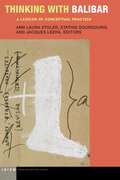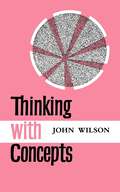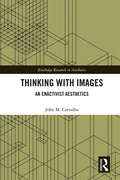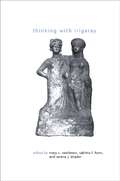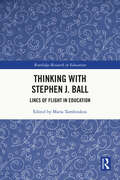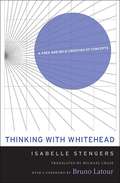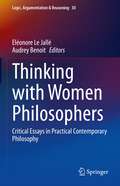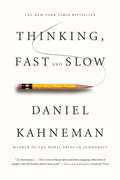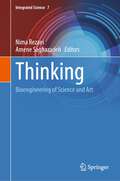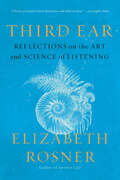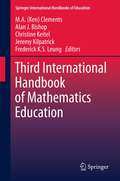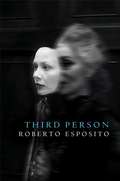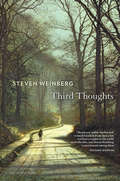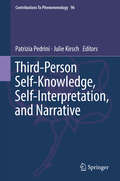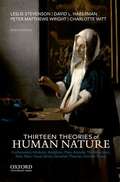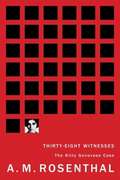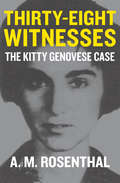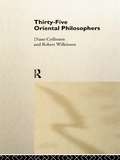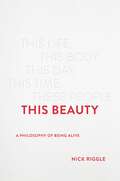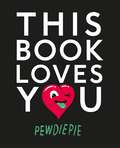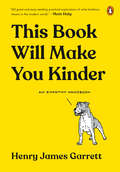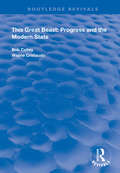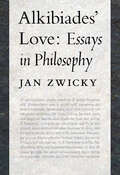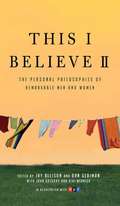- Table View
- List View
Thinking with Balibar: A Lexicon of Conceptual Practice (Idiom: Inventing Writing Theory)
by Ann Laura Stoler, Stathis Gourgouris and Jacques LezraThis volume, the first sustained critical work on the French political philosopher Étienne Balibar, collects essays by sixteen prominent philosophers, psychoanalysts, anthropologists, sociologists, and literary critics who each identify, define, and explore a central concept in Balibar’s thought. The result is a hybrid lexicon-engagement that makes clear the depth and importance of Balibar’s contribution to the most urgent topics in contemporary thought. The book shows the continuing vitality of materialist thought across the humanities and social sciences and will be fundamental for understanding the philosophical bases of the contemporary left critique of globalization, neoliberalism, and the articulation of race, racism, and economic exploitation.Contributors: Emily Apter, Étienne Balbar, J. M. Bernstein, Judith Butler, Monique David-Ménard, Hanan Elsayed, Didier Fassin, Stathis Gourgouris, Bernard E. Harcourt, Jacques Lezra, Patrice Maniglier, Warren Montag, Adi Ophir, Bruce Robbins, Ann Laura Stoler, Gary Wilder
Thinking with Concepts
by John WilsonIn his preface Mr Wilson writes â I feel that a great many adults â ¦ would do better to spend less time in simply accepting the concepts of others uncritically, and more time in learning how to analyse concepts in general'. Mr Wilson starts by describing the techniques of conceptual analysis. He then gives examples of them in action by composing answers to specific questions and by criticism of quoted passages of argument. Chapter 3 sums up the importance of this kind of mental activity. Chapter 4 presents selections for the reader to analyse, followed by questions of university entrance/scholarship type. This is a book to be worked through, in a sense a text-book.
Thinking with Images: An Enactivist Aesthetics (Routledge Research in Aesthetics)
by John M. CarvalhoThis book advances an enactivist theory of aesthetics through the study of inscrutable artworks that challenge us to think because we do not know what to think about them. John M. Carvalho presents detailed analyses a four artworks that share this unique characteristic: Francis Bacon’s Study After Velázquez’s Portrait of Pope Innocent X (1953), the photographs of Duane Michals, based on a retrospective of his work, Storyteller, at the Carnegie Museum of Art (2014), Étant donnés (1968) by Marcel Duchamp, and Jean-Luc Godard’s 1963 film Le Mépris (released in the United States as Contempt). Carvalho argues against the application of theory to derive appreciation or meaning from these artistic works. Rather, each study enacts an embodied cognitive engagement with the specific artworks intended to demonstrate the value of thinking about artworks that might be extended to our engagement with the world in general. This thinking happens, as these studies show, when we trust our embodied skills and their guide to what artworks and the world around us afford for the activation and refinement of those skills. Thinking with Images will be of interest to scholars working in the philosophy of art and philosophical aesthetics, as well as art historians concerned with the meaning and value of contemporary art.
Thinking with Irigaray (SUNY series in Gender Theory)
by Mary C. Rawlinson Serene J. Khader Sabrina L. HomThinking with Irigaray takes up Irigaray's challenge to think beyond the androcentric, one-subject culture, identifying much that is useful and illuminative in Irigaray's work while also questioning some of her assumptions and claims. Some contributors reject outright her prescriptions for changing our culture, others suggest that her prescriptions are inconsistent with the basic ethical concerns of her project, and still others attempt to identify blind spots in her work. By confronting and challenging the mechanisms of masculine domination Irigaray has identified and applying these insights to a wide range of practical and contemporary concerns, including popular media representations of women's sexuality, feminist practice in the arts, political resistance, and yoga, the contributors demonstrate the unique potential of Irigaray's thought within feminist philosophy and gender studies.
Thinking with Kant’s Critique of Judgment
by Michel ChaouliMichel Chaouli invites novice and expert alike to set out on the path of thinking, with help from Kant’s Critique of Judgment, about the force of aesthetic experience, the essence of art, and the relationship of beauty and meaning. Each chapter unfolds the significance of a key concept for Kant’s thought and our own ideas.
Thinking with Stephen J. Ball: Lines of Flight in Education (Routledge Research in Education)
by Maria TamboukouThis edited volume explores how Stephen Ball’s work has shaped the field of the sociology of education worldwide. Written by internationally based researchers who are Ball’s former PhD students, it draws on different strands of his work to show what it means to think, write and do research inspired by Ball’s theory, methodology and epistemology. The contributions revolve around a wide range of themes including: the ethics of doing educational research, disability studies, the bio-politics of the child’s soul, lived experiences of marginalisation in education, educating migrant and refugee women in the borderlands and post-Brexit reflections on the Bologna process. Chapters draw on different lines of thought from the corpus of a significant and influential figure in the sociology of education to present, explicate and discuss a wide range of research projects, themes, theoretical directions, as well as methodological approaches in the field of the sociology of education today. More than celebrating Ball’s scholarship, this volume shows new and innovative directions in the sociology of education. It will be highly relevant reading for researchers, scholars, and students in the sociology of education, educational policy and politics and educational theory.
Thinking with Whitehead: A Free and Wild Creation of Concepts
by Bruno Latour Michael Chase Isabelle StengersIn Thinking with Whitehead, Isabelle Stengers--one of today's leading philosophers of science--goes straight to the beating heart of Whitehead's thought. Both an erudite yet accessible introduction and a highly advanced commentary, it establishes the mathematician-philosopher as a daring thinker on par with Deleuze, Guattari, and Foucault.
Thinking with Women Philosophers: Critical Essays in Practical Contemporary Philosophy (Logic, Argumentation & Reasoning #30)
by Eléonore Le Jallé Audrey BenoitThis book focuses on some English-speaking women philosophers who have been major actors since the 20th century in the field of practical philosophy, namely political and social philosophy, feminist approaches to philosophy, moral psychology, the theory of action and ethics. The book explores topics linked to the main aspects of the thought of those philosophers, i.e. Elizabeth Anscombe, Judith Butler, Philippa Foot, Nancy Fraser, Carol Gilligan and Martha Nussbaum. Six women French commentators have written a chapter on each of those women anglo-american philosophers, creating a dialogue as they think with them, elaborating their own positions in their respective fields.
Thinking, Fast And Slow
by Daniel KahnemanFirst is fast, intuitive, and emotional; Second is slower, more deliberative, and more logical. The impact of overconfidence on corporate strategies, the difficulties of predicting what will make us happy in the future, the profound effect of cognitive biases on everything from playing the stock market to planning our next vacation--each of these can be understood only by knowing how the two systems shape our judgements and decisions. <p> <b>New York Times Bestseller</b>
Thinking: Bioengineering of Science and Art (Integrated Science #7)
by Nima Rezaei Amene SaghazadehThe “THINKING: Bioengineering of Science and Art” is to discuss about philosophical aspects of thinking at the context of Science and Art. External representations provide evidence that the fundamental process of thinking exists in both animal subjects and humans. However, the diversity and complexity of thinking in humans is astonishing because humans have been permitted to integrate scientific accounts into their accounts and create excellent illustrations for the effects of this integration. The book necessarily begins with the origins of human thinking and human thinking into self and others, body, and life. Multiple factors tend to modify the pattern of thinking. They all will come into play by this book that brings thinking into different disciplines: humanities, natural sciences, social sciences, formal sciences, and applied sciences. The thinking demands full processing of information, and therefore, the book considers the economy of thinking as well. The book thoroughly intends to explore thinking beyond the boundaries. Specifically, several chapters are devoted to discipline this exploration either by artistic thinking alone or by art and mathematics-aided engineering of complexities. In this manner, the book models variations on thinking at the individual and systems levels and accumulates a list of solutions, each good for specific scenarios and maximal outcomes.
Third Ear: Reflections on the Art and Science of Listening
by Elizabeth RosnerThis illuminating book weaves personal stories of a multilingual upbringing with the latest scientific breakthroughs in interspecies communication to show how the skill of deep listening enhances our curiosity and empathy toward the world around usThird Ear braids together personal narrative with scholarly inquiry to examine the power of listening to build interpersonal empathy and social transformation. A daughter of Holocaust survivors, Rosner shares stories from growing up in a home where six languages were spoken to interrogate how psychotherapy, neurolinguistics, and creativity can illuminate the complex ways we are impacted by the sounds and silences of others.Drawing on expertise from journalists, podcasters, performers, translators, acoustic biologists, spiritual leaders, composers, and educators, this hybrid text moves fluidly along a spectrum from molecular to global to reveal how third-ear listening can be a collective means for increased understanding and connection to the natural world.
Third International Handbook of Mathematics Education
by Frederick K.S. Leung M. A. Ken Clements Alan J. Bishop Jeremy Kilpatrick Christine Keitel-KreidtThe four sections in this Third International Handbook are concerned with: (a) social, political and cultural dimensions in mathematics education; (b) mathematics education as a field of study; (c) technology in the mathematics curriculum; and (d) international perspectives on mathematics education. These themes are taken up by 84 internationally-recognized scholars, based in 26 different nations. Each of section is structured on the basis of past, present and future aspects. The first chapter in a section provides historical perspectives ("How did we get to where we are now?"); the middle chapters in a section analyze present-day key issues and themes ("Where are we now, and what recent events have been especially significant?"); and the final chapter in a section reflects on policy matters ("Where are we going, and what should we do?"). Readership: Teachers, mathematics educators, ed.policy makers, mathematicians, graduate students, undergraduate students. Large set of authoritative, international authors.
Third Person: Politics of Life and Philosophy of the Impersonal
by Roberto EspositoThe radical and alarming thesis put forward in this book is that the notion of person is unable to bridge this gap because it is precisely what creates this breach. Its primary effect is to create a separation in both the human race and the individual between a rational, voluntary part endowed with particular value and another, purely biological part that is thrust by the first into the inferior dimension of the animal or the thing. In opposition to the performative power of the person, whose dual origins can be traced back to ancient Rome and Christianity, Esposito pursues his strikingly original and innovative philosophical inquiry by inviting reflection on the category of the impersonal: the third person, in removing itself from the exclusionary mechanism of the person, points toward the orginary unity of the living being.
Third Thoughts
by Steven WeinbergOne of the world’s most captivating scientists challenges us to think about nature’s foundations and the entanglement of science and society. Steven Weinberg, author of The First Three Minutes, offers his views on fascinating aspects of physics and the universe, but does not seclude science behind disciplinary walls, or shy away from politics.
Third-Person Self-Knowledge, Self-Interpretation, and Narrative (Contributions To Phenomenology #96)
by Patrizia Pedrini Julie KirschThis volume answers questions that lead to a clearer picture of third-person self- knowledge, the self-interpretation it embeds, and its narrative structure. Bringing together current research on third-person self-knowledge and self-interpretation, the book focuses on third-person self-knowledge, and the role that narrative and interpretation play in acquiring it. It regards the third-personal epistemic approach to oneself as a problem worthy of investigation in its own right, and makes clear the relation between third-person self-knowledge, self-interpretation, and narrative capacities. In recent years, the idea that each person is in a privileged position to acquire knowledge about her own mental states has come under attack. A growing body of empirical research has cast doubt upon the existence of what philosophers call ‘first person self-knowledge’, i.e., knowledge about our mental states that is often thought to be immediate, transparent, and authoritative. This line of thought has led some philosophers to claim that what seems to be ‘first-person self-knowledge’ is really just ‘third-person self-knowledge,’ i.e., knowledge about our mental states that is inferential, opaque, and fallible. This book discusses challenges for first-person knowledge and explores the true nature of third-person knowledge.
Thirteen Theories of Human Nature (Seventh Edition)
by Leslie Stevenson David L. Haberman Charlotte Witt Peter Matthews WrightOver six previous editions, Twelve Theories of Human Nature has been a remarkably popular introduction to some of the most influential developments in Western and Eastern thought. Now titled Thirteen Theories of Human Nature, the seventh edition adds a chapter on feminist theory to those on Confucianism, Hinduism, Buddhism, Plato, Aristotle, the Bible, Islam, Kant, Marx, Freud, Sartre, and Darwinism.
Thirty-Eight Witnesses: The Kitty Genovese Case
by A. M. Rosenthal"[Rosenthal] told a stunning, tragic story and called each one of us to account for averting our eyes-- and hearts-- and voices." -Mike Wallace, 60 Minutes. It remains one of the most notorious deaths in New York City history not because of who was murdered but because of the circumstances: 28-year-old Kitty Genovese was brutally murdered, in an attack that took nearly thirty minutes and had thirty-eight witnesses... not one of whom did a thing to stop the murderer or even call for help. A.M. Rosenthal, who would later become one of the most famous and controversial editors The New York Times has ever had, was the newspaper's city editor then; the murder happened on his beat. He first published this book in 1964, the year of the murder. It is part memoir, part investigative journalism, and part public service.
Thirty-Eight Witnesses: The Kitty Genovese Case
by A. M. RosenthalA Pulitzer Prize-winning journalist's groundbreaking account of the crime that shocked New York City--and the world In the early hours of March 13, 1964, twenty-eight-year-old Catherine "Kitty" Genovese was stabbed to death in the middle-class neighborhood of Kew Gardens, Queens. The attack lasted for more than a half hour--enough time for Genovese's assailant to move his car and change hats before returning to rape and kill her just a few steps from her front door. Yet it was not the brutality of the murder that made it international news. It was a chilling detail Police Commissioner Michael Joseph Murphy shared with A. M. Rosenthal of the New York Times: Thirty-eight of Genovese's neighbors witnessed the assault--and none called for help. To Rosenthal, who had recently returned to New York after spending a decade overseas and would become the Times's longest-serving executive editor, that startling statistic spoke volumes about both the turbulence of the 1960s and the enduring mysteries of human nature. His impassioned coverage of the case sparked a firestorm of public indignation and led to the development of the psychological theory known as the "bystander effect." Thirty-Eight Witnesses is indispensable reading for students of journalism and anyone seeking to learn about one of the most infamous crimes of the twentieth century.
Thirty-Five Oriental Philosophers
by Robert Wilkinson Diané Collinson Dr Robert WilkinsonThese are questions to which oriental thinkers have given a wide range of philosophical answers that are intellectually and imaginatively stimulating. Thirty-Five Oriental Philosophers is a succinctly informative introduction to the thought of thirty-five important figures in the Chinese, Indian, Arab, Japanese and Tibetan philosophical traditions. Thinkers covered include founders such as Zoroaster, Confucius, Buddha and Muhammed, as well as influential modern figures such as Gandhi, Mao Tse-Tung, Suzuki and Nishida. The book is divided into sections, in which an introduction to the tradition it covers precedes the essays on its individual philosophers. Notes, further reading lists, and cross-references provide the student with a clear route to further study. There is a glossary of key terms at the end of the book.
This Beauty: A Philosophy of Being Alive
by Nick RiggleAn acclaimed philosopher and new father argues that engaging with beauty can make life worth living You didn&’t choose to live this life, in this body, in these conditions—this delicate and difficult life. Yet when you consider that your existence is fleeting, an inspired sense of urgency can spring forth. Say you often hike with a friend. One day, they propose that you skydive instead. You&’re wavering, and they insist: Come on. You only live once! And soon you&’re flying through the air. Why embrace a life you did not choose? In This Beauty, philosopher Nick Riggle explores the beauty of being alive by investigating the things we say to inspire ourselves and each other: seize the day, treat yourself, you only live once. These clichés are at best vague, at worst stupid. They imply that you should do something wild with your life because your life is precious, a little like saying you should go swimming with your grandfather&’s watch because it is irreplaceable. Drawing on insights from aesthetics and his experiences as a professional skater and new father, he develops the thought that beauty—the beauty of this day, this body, this moment, these people—can make life worth embracing, worth engaging with and amplifying as beautiful. Insightful and deeply humane, This Beauty is a searching inquiry into the mystery of life&’s beauty and a call to create and share it.
This Book Loves You
by PewDiePieThis Book Loves You by PewDiePie is a collection of beautifully illustrated inspirational sayings by which you should live your life. If you follow each and every one, your life will become easier, more fabulous, more rewarding. Imagine what a chilled-out and wonderful human being people would think you were if you lived by the simple principle "You can never fail if you never try." Your wasted life would be an inspiration to others. Think of all the pointless, unhappy striving you could simply give up. Throw away that guitar! Give up on your dreams! Embrace your astounding mediocrity. This Book Loves You has something for everyone--or at least everyone willing to give up and stop caring. If all else fails, remember: "Don&’t be yourself. Be a pizza. Everyone loves pizza."
This Book Will Make You Kinder: An Empathy Handbook
by Henry James GarrettFrom the creator of Drawings of Dogs, a warmly illustrated and thoughtful examination of empathy and the necessity of being kinderThe kindness we owe one another goes far beyond the everyday gestures of feeding someone else's parking meter--although it's important not to downplay those small acts. Kindness can also mean much more. In this timely, insightful guide, Henry James Garrett lays out the case for developing a strong, courageous, moral kindness, one that will help you fight cruelty and make the world a more empathetic place.So, how could a book possibly make you kinder? It would need to answer two questions: • Why are you kind at all? and, • Why aren't you kinder?In these pages, building on his academic studies in metaethics and using his signature-sweet animal cartoons, Henry James Garrett sets out to do just that, exploring the sources and the limitations of human empathy and the many ways, big and small, that we can work toward being our best and kindest selves for the people around us and the society we need to build.
This Great Beast: Progress and the Modern State (Routledge Revivals)
by R. Catley W. CristaudoFirst published in 1997, this volume follows Catley and Cristaudo as they defend Western Civilization against all comers: against the rest of the world, especially the Third World, and against its own internal irritants: ‘the scribblings of the intelligentsia’ by idealist philosophers, feminists, greens, post-moderns, multiculturalists, Orientalists, anti-nationalists, socialists and Keynesians, most of them tenured academics in the arts and social sciences. As academic political scientists themselves they have done time in a number of the ideological prisons they attack, and they write about those states of mind with experienced cynicism ... As in Paradise Lost, the devil gets all the best tunes. The identification of civilization’s enemies is wildly, sometimes hilariously, politically incorrect.
This Great National Object: Essays in Philosophy
by Jan ZwickyMaking extensive use of the National Archives and the Archives of Ontario, Styran and Taylor unveil previously unpublished information about the construction of the canals, including technical plans and drawings from a wide variety of sources. They illustrate the technical and management intricacies of building a navigational trade and commerce lifeline while also revealing the vivid characters - from businessman William Hamilton Merritt to engineer John Page - who inspired the project and drove it to completion. The history of the Welland Canals is a gripping tale of epic proportions. Given the ongoing importance of the Great Lakes in the North American economy, interest in the St. Lawrence Seaway - of which the Welland is "the Great Swivel Link" - and the relevance of labour history, This Great National Object will be of interest to enthusiasts and historians alike.
This I Believe II: The Personal Philosophies of Remarkable Men and Women
by Dan Gediman Jay AllisonFeaturing 80 Americans--from the famous to the unknown--this series of insightful observations completes the thought that the book's title introduces. Each piece compels readers to rethink not only how they arrive at their own personal beliefs but also how they share them with others.
